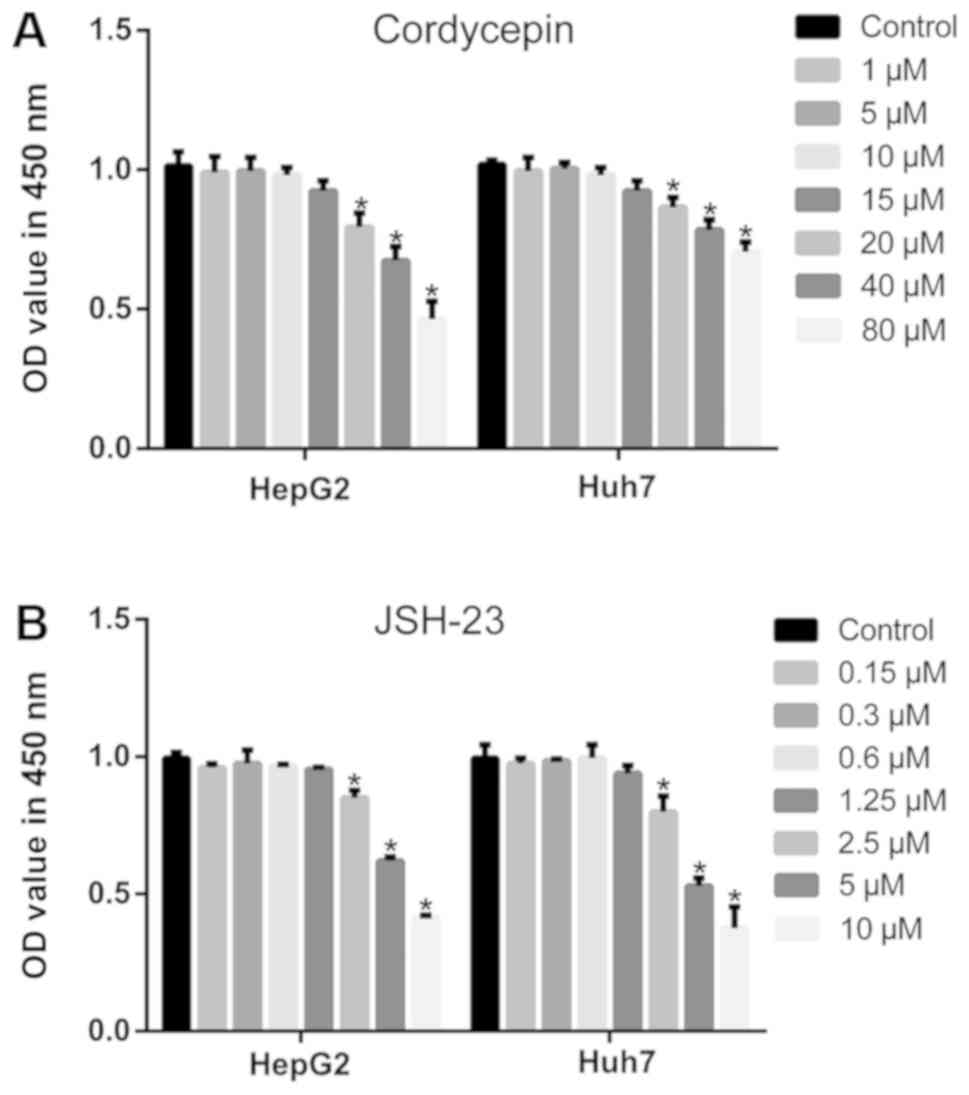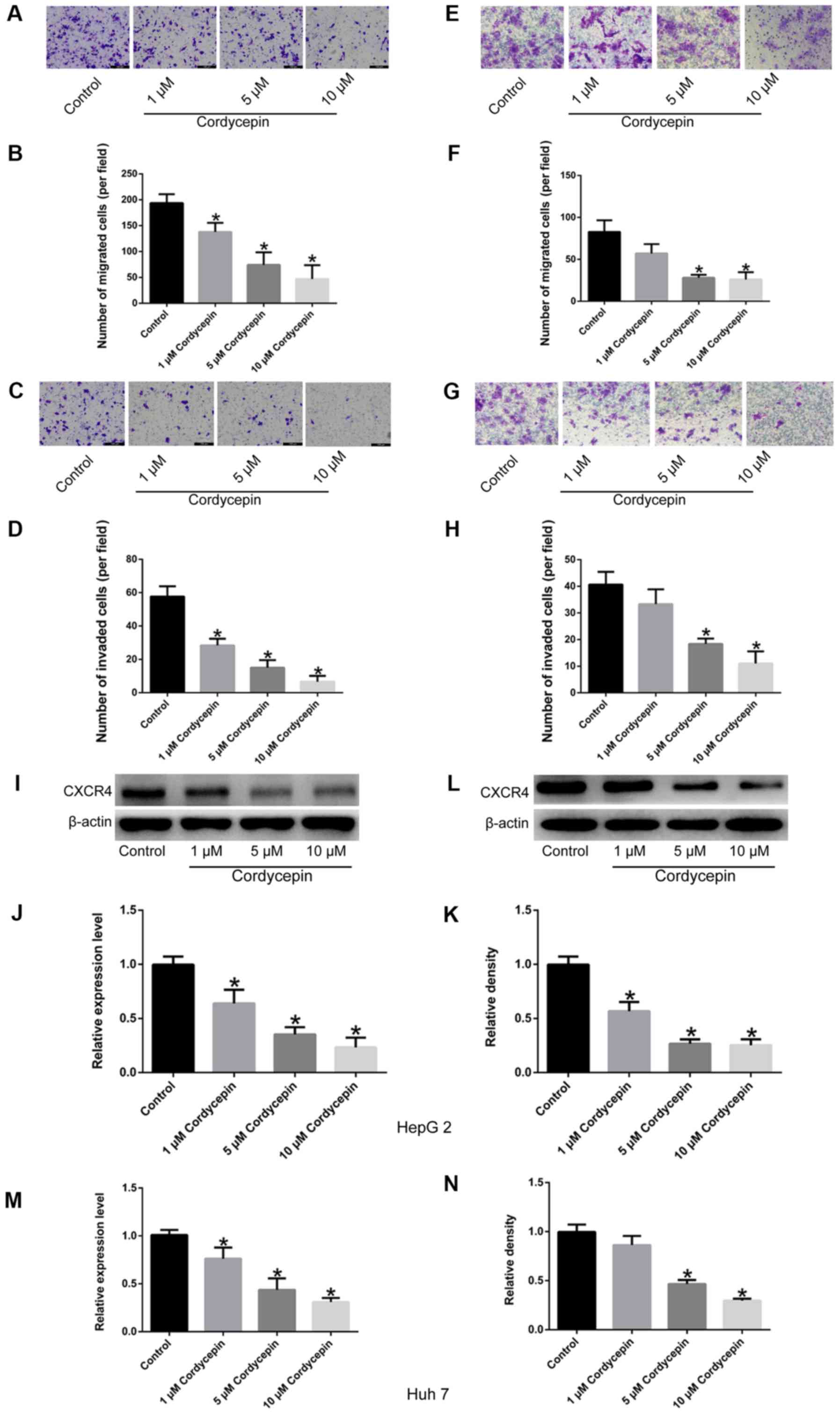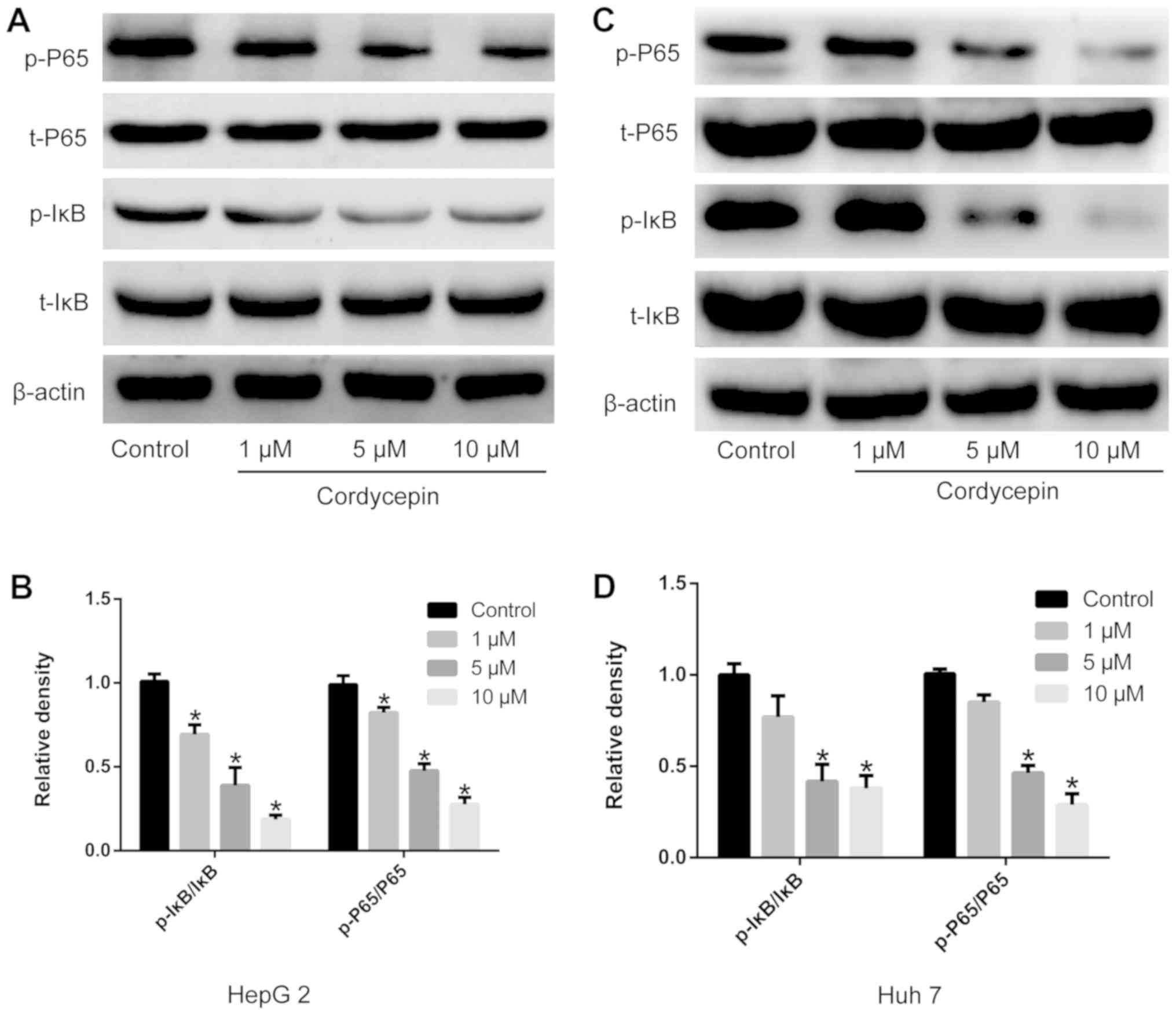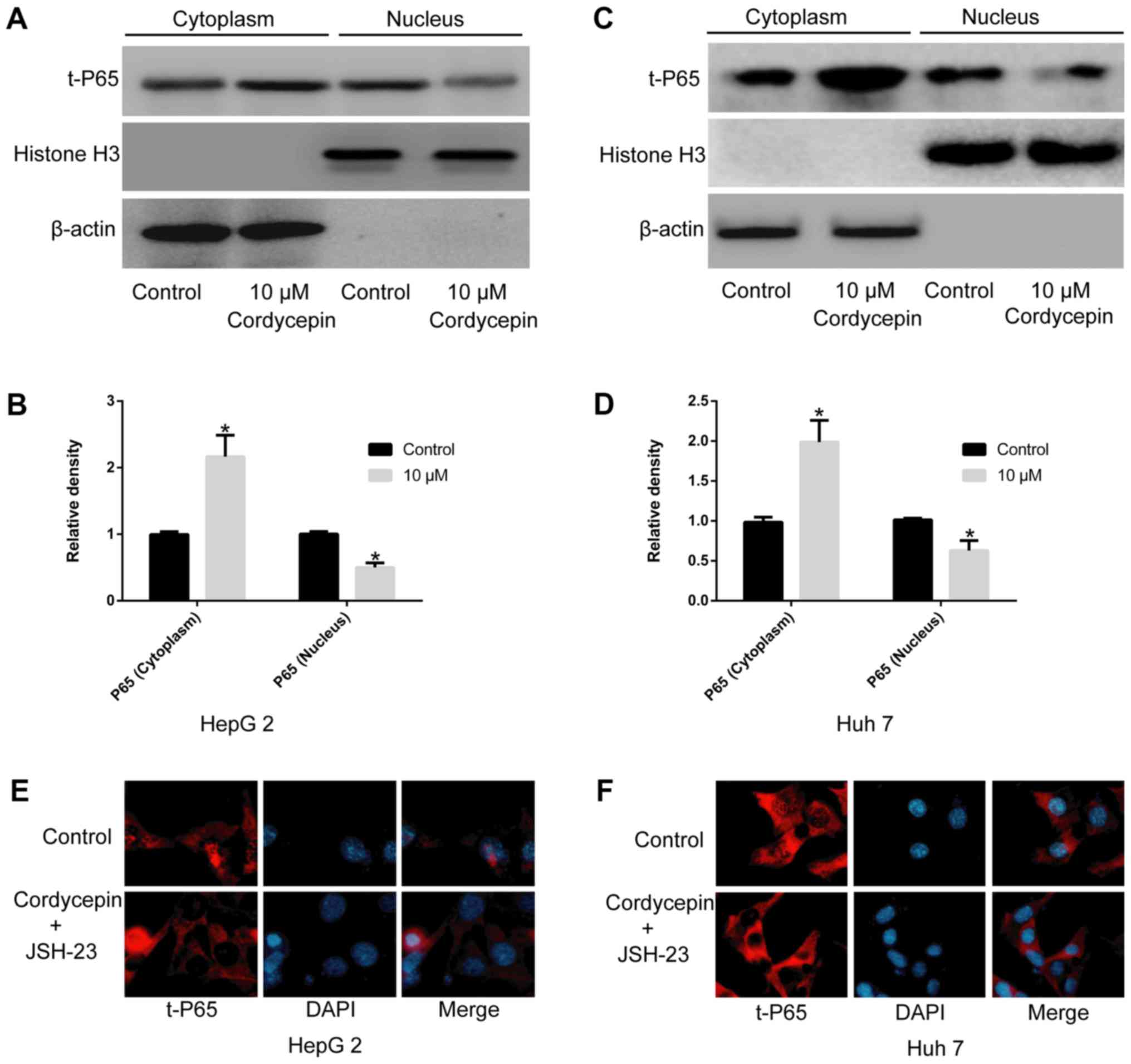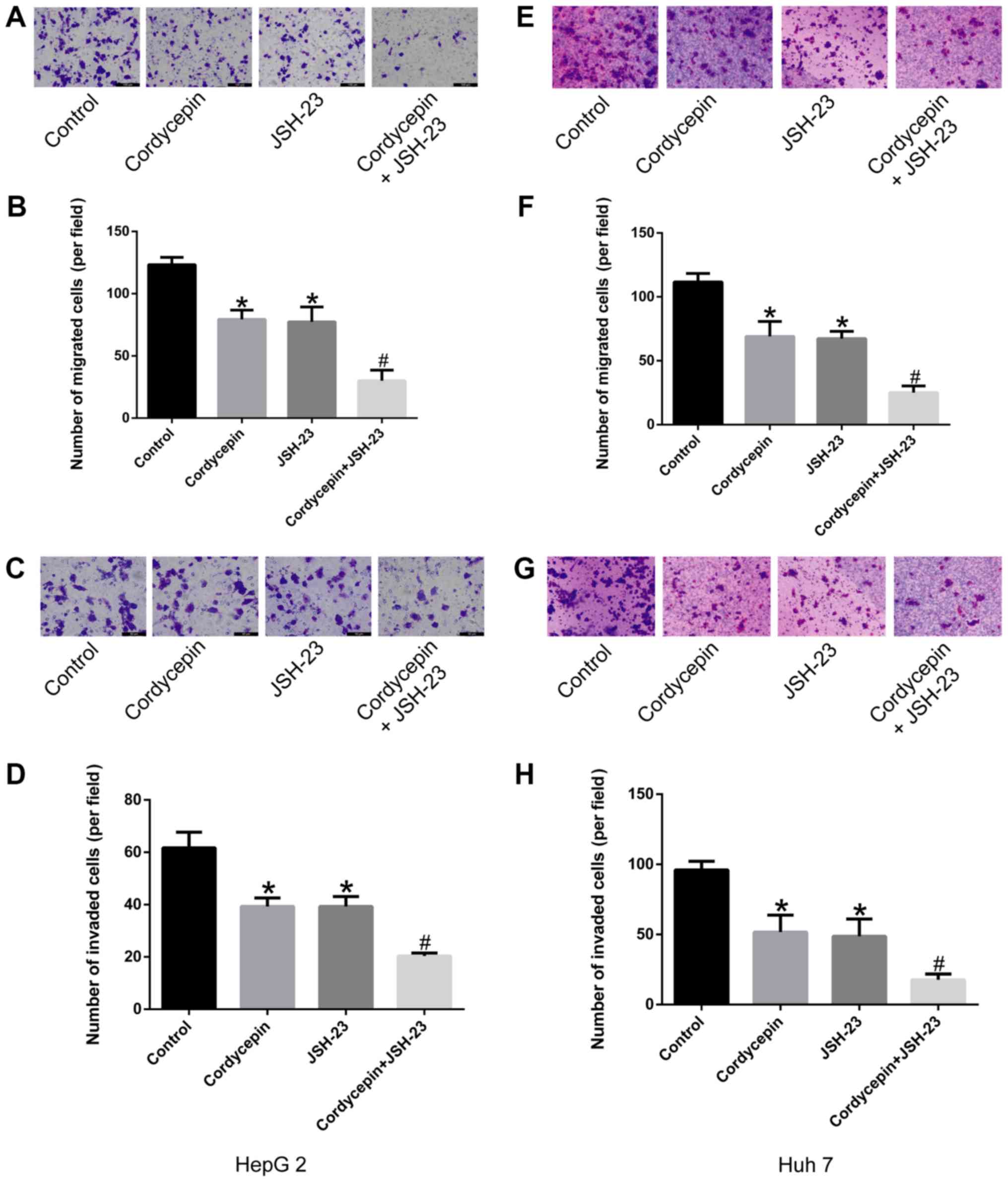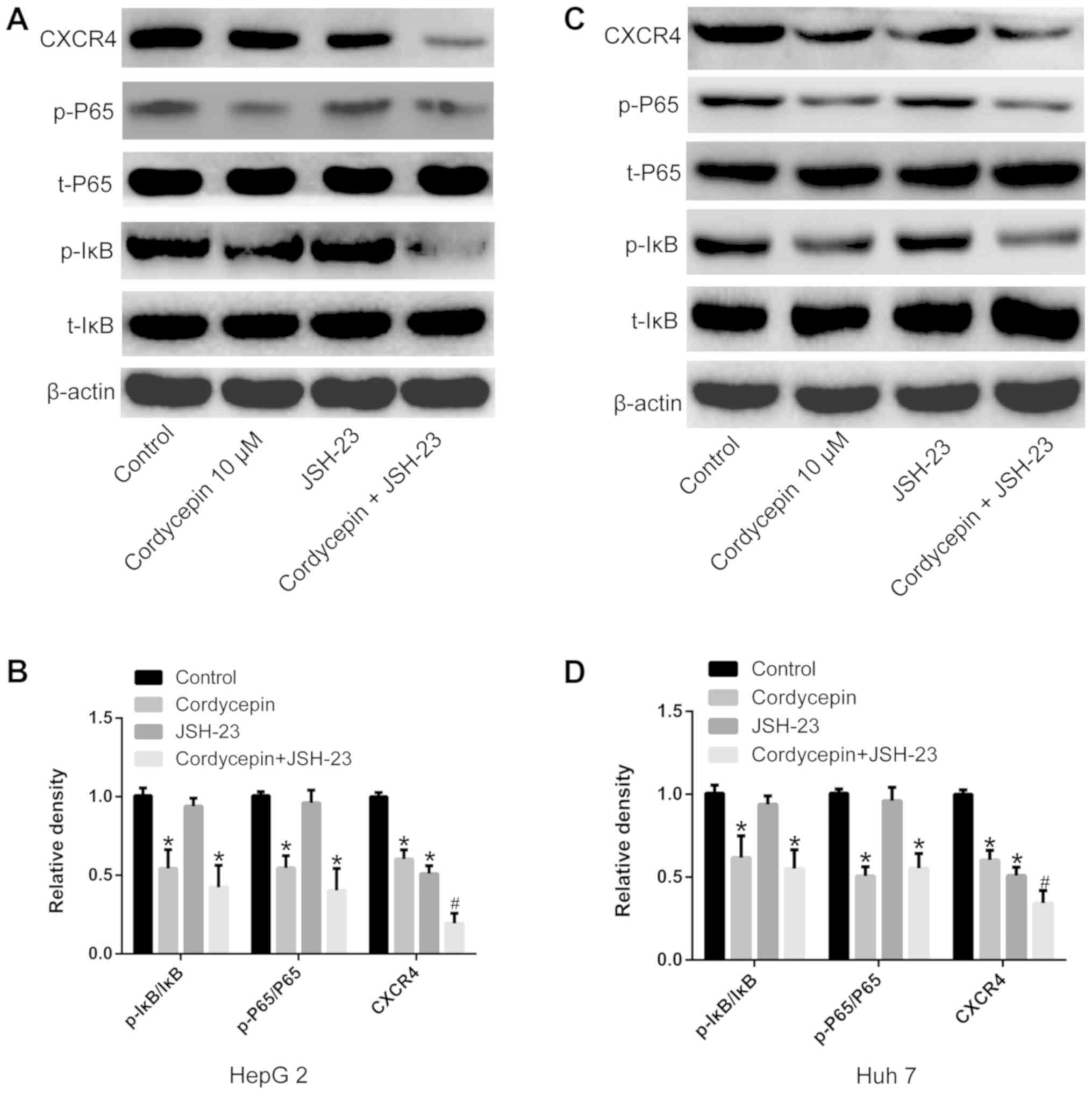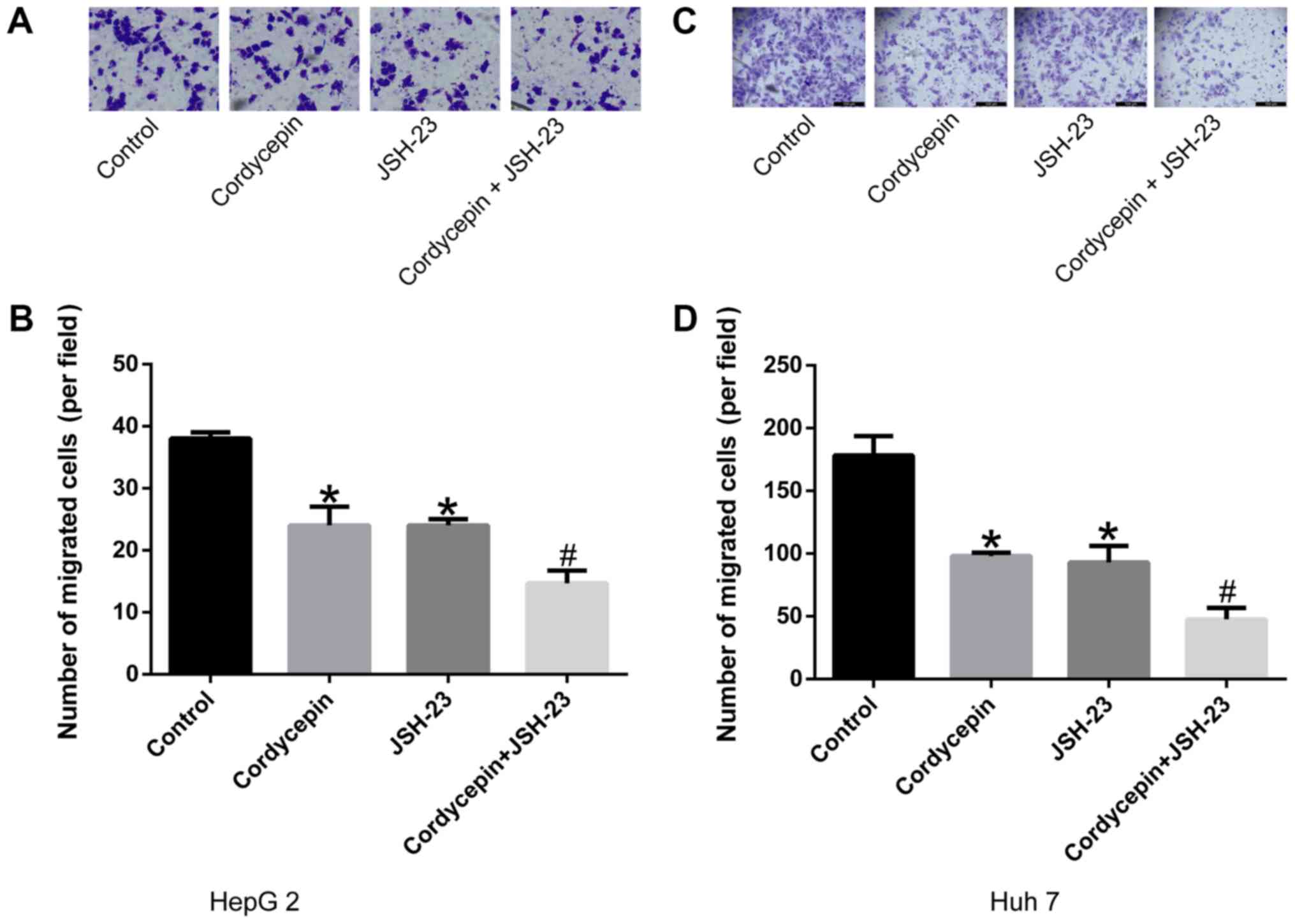|
1
|
Allemani C, Matsuda T, Di Carlo V,
Harewood R, Matz M, Nikšić M, Bonaventure A, Valkov M, Johnson CJ,
Estève J, et al CONCORD Working Group: Global surveillance of
trends in cancer survival 2000-14 (CONCORD 3): analysis of
individual records for 37,513,025 patients diagnosed with one of 18
cancers from 322 population based registries in 71 countries.
Lancet. 391:1023–1075. 2018. View Article : Google Scholar : PubMed/NCBI
|
|
2
|
Siegel RL, Miller KD and Jemal A: Cancer
statistics, 2018. CA Cancer J Clin. 68:7–30. 2018. View Article : Google Scholar : PubMed/NCBI
|
|
3
|
Chen W, Zheng R, Baade PD, Zhang S, Zeng
H, Bray F, Jemal A, Yu XQ and He J: Cancer statistics in China,
2015. CA Cancer J Clin. 66:115–132. 2016. View Article : Google Scholar : PubMed/NCBI
|
|
4
|
Chen W, Zheng R, Zhang S, Zeng H, Zuo T,
Xia C, Yang Z and He J: Cancer incidence and mortality in China in
2013: an analysis based on urbanization level. Chin J Cancer Res.
29:1–10. 2017. View Article : Google Scholar : PubMed/NCBI
|
|
5
|
Zheng R, Qu C, Zhang S, Zeng H, Sun K, Gu
X, Xia C, Yang Z, Li H, Wei W, et al: Liver cancer incidence and
mortality in China: Temporal trends and projections to 2030. Chin J
Cancer Res. 30:571–579. 2018. View Article : Google Scholar
|
|
6
|
Liu CY, Chen KF and Chen PJ: Treatment of
Liver Cancer. Cold Spring Harb Perspect Med. 5:a0215352015.
View Article : Google Scholar : PubMed/NCBI
|
|
7
|
Shiani A, Narayanan S, Pena L and Friedman
M: The Role of Diagnosis and Treatment of Underlying Liver Disease
for the Prognosis of Primary Liver Cancer. Cancer control.
24:10732748177292402017. View Article : Google Scholar : PubMed/NCBI
|
|
8
|
Li S, Yang F and Ren X: Immunotherapy for
hepatocellular carcinoma. Drug Discov Ther. 9:363–371. 2015.
View Article : Google Scholar : PubMed/NCBI
|
|
9
|
Yu S, Wang Y, Jing L, Claret FX, Li Q,
Tian T, Liang X, Ruan Z, Jiang L, Yao Y, et al: Autophagy in the
'inflammation-carcinogenesis' pathway of liver and HCC
immunotherapy. Cancer Lett. 411:82–89. 2017. View Article : Google Scholar : PubMed/NCBI
|
|
10
|
Klungboonkrong V, Das D and McLennan G:
Molecular Mechanisms and Targets of Therapy for Hepatocellular
Carcinoma. J Vasc Interv Radiol. 28:949–955. 2017. View Article : Google Scholar : PubMed/NCBI
|
|
11
|
Kudo M and Arizumi T: Transarterial
Chemoembolization in Combination with a Molecular Targeted Agent:
Lessons Learned from Negative Trials (Post-TACE, BRISK-TA, SPACE,
ORIENTAL, and TACE-2). Oncology. 93(Suppl 1): 127–134. 2017.
View Article : Google Scholar : PubMed/NCBI
|
|
12
|
Tohme S, Simmons RL and Tsung A: Surgery
for Cancer: A Trigger for Metastases. Cancer Res. 77:1548–1552.
2017. View Article : Google Scholar : PubMed/NCBI
|
|
13
|
Zeeshan R and Mutahir Z: Cancer metastasis
- tricks of the trade. Bosn J Basic Med Sci. 17:172–182.
2017.PubMed/NCBI
|
|
14
|
Chaffer CL and Weinberg RA: A perspective
on cancer cell metastasis. Science. 331:1559–1564. 2011. View Article : Google Scholar : PubMed/NCBI
|
|
15
|
Ai J, Tang Q, Wu Y, Xu Y, Feng T, Zhou R,
Chen Y, Gao X, Zhu Q, Yue X, et al: The role of polymeric
immunoglobulin receptor in inflammation-induced tumor metastasis of
human hepatocellular carcinoma. J Natl Cancer Inst. 103:1696–1712.
2011. View Article : Google Scholar : PubMed/NCBI
|
|
16
|
Budhu A, Forgues M, Ye QH, Jia HL, He P,
Zanetti KA, Kammula US, Chen Y, Qin LX, Tang ZY, et al: Prediction
of venous metastases, recurrence, and prognosis in hepatocellular
carcinoma based on a unique immune response signature of the liver
microenvironment. Cancer Cell. 10:99–111. 2006. View Article : Google Scholar : PubMed/NCBI
|
|
17
|
Ma C, Han M, Heinrich B, Fu Q, Zhang Q,
Sandhu M, Agdashian D, Terabe M, Berzofsky JA, Fako V, et al: Gut
microbiome-mediated bile acid metabolism regulates liver cancer via
NKT cells. Science. 360:eaan59312018. View Article : Google Scholar : PubMed/NCBI
|
|
18
|
Song T, Dou C, Jia Y, Tu K and Zheng X:
TIMP-1 activated carcinoma-associated fibroblasts inhibit tumor
apoptosis by activating SDF1/CXCR4 signaling in hepatocellular
carcinoma. Oncotarget. 6:12061–12079. 2015. View Article : Google Scholar : PubMed/NCBI
|
|
19
|
Wang J, Huang Y, Zhang J, Xing B, Xuan W,
Wang H, Huang H, Yang J and Tang J: High co-expression of the
SDF1/CXCR4 axis in hepatocarcinoma cells is regulated by AnnexinA7
in vitro and in vivo. Cell Commun Signal. 16:222018. View Article : Google Scholar : PubMed/NCBI
|
|
20
|
Gao PT, Ding GY, Yang X, Dong RZ, Hu B,
Zhu XD, Cai JB, Ji Y, Shi GM, Shen YH, et al: Invasive potential of
hepatocellular carcinoma is enhanced by loss of selenium-binding
protein 1 and subsequent upregulation of CXCR4. Am J Cancer Res.
8:1040–1049. 2018.PubMed/NCBI
|
|
21
|
Li M, Lu Y, Xu Y, Wang J, Zhang C, Du Y,
Wang L, Li L, Wang B, Shen J, et al: Horizontal transfer of
exosomal CXCR4 promotes murine hepatocarcinoma cell migration,
invasion and lymphangiogenesis. Gene. 676:101–109. 2018. View Article : Google Scholar : PubMed/NCBI
|
|
22
|
Chen Y, Liu YC, Sung YC, Ramjiawan RR, Lin
TT, Chang CC, Jeng KS, Chang CF, Liu CH, Gao DY, et al: Overcoming
sorafenib evasion in hepatocellular carcinoma using CXCR4-targeted
nanoparticles to co-deliver MEK-inhibitors. Sci Rep. 7:441232017.
View Article : Google Scholar : PubMed/NCBI
|
|
23
|
Li X, Li P, Chang Y, Xu Q, Wu Z, Ma Q and
Wang Z: The SDF-1/CXCR4 axis induces epithelial-mesenchymal
transition in hepatocellular carcinoma. Mol Cell Biochem.
392:77–84. 2014. View Article : Google Scholar : PubMed/NCBI
|
|
24
|
Wang X, Zhang W, Ding Y, Guo X, Yuan Y and
Li D: CRISPR/Cas9-mediated genome engineering of CXCR4 decreases
the malignancy of hepatocellular carcinoma cells in vitro and in
vivo. Oncol Rep. 37:3565–3571. 2017. View Article : Google Scholar : PubMed/NCBI
|
|
25
|
Xia R, Sheng X, Xu X, Yu C and Lu H:
Hesperidin induces apoptosis and G0/G1 arrest in human non-small
cell lung cancer A549 cells. Int J Mol Med. 41:464–472. 2018.
|
|
26
|
Xia R, Xu G, Huang Y, Sheng X, Xu X and Lu
H: Hesperidin suppresses the migration and invasion of non-small
cell lung cancer cells by inhibiting the SDF-1/CXCR-4 pathway. Life
Sci. 201:111–120. 2018. View Article : Google Scholar : PubMed/NCBI
|
|
27
|
Fontanella R, Pelagalli A, Nardelli A,
D'Alterio C, Ieranò C, Cerchia L, Lucarelli E, Scala S and Zannetti
A: A novel antagonist of CXCR4 prevents bone marrow-derived
mesenchymal stem cell-mediated osteosarcoma and hepatocellular
carcinoma cell migration and invasion. Cancer Lett. 370:100–107.
2016. View Article : Google Scholar
|
|
28
|
Kaemmerer D, Schindler R, Mußbach F,
Dahmen U, Altendorf-Hofmann A, Dirsch O, Sänger J, Schulz S and
Lupp A: Somatostatin and CXCR4 chemokine receptor expression in
hepatocellular and cholangiocellular carcinomas: Tumor capillaries
as promising targets. BMC Cancer. 17:8962017. View Article : Google Scholar : PubMed/NCBI
|
|
29
|
Mardomi A, Sabzichi M, Hussein Somi M,
Shanehbandi D, Rahbarghazi R, Taj Sanjarani O and Samadi N:
Trafficking mechanism of bone marrow-derived mesenchymal stem cells
toward hepatocellular carcinoma HepG2 cells by modulating Endoglin,
CXCR4 and TGF-β. Cell Mol Biol (Noisy-le-grand). 62:81–86.
2016.
|
|
30
|
Chen YC, Chen YH, Pan BS, Chang MM and
Huang BM: Functional study of Cordyceps sinensis and cordycepin in
male reproduction: A review. Yao Wu Shi Pin Fen Xi. 25:197–205.
2017.
|
|
31
|
Tuli HS, Sharma AK, Sandhu SS and Kashyap
D: Cordycepin: A bioactive metabolite with therapeutic potential.
Life Sci. 93:863–869. 2013. View Article : Google Scholar : PubMed/NCBI
|
|
32
|
Yoon SY, Park SJ and Park YJ: The
Anticancer Properties of Cordycepin and Their Underlying
Mechanisms. Int J Mol Sci. 19:E30272018. View Article : Google Scholar : PubMed/NCBI
|
|
33
|
Wei C, Yao X, Jiang Z, Wang Y, Zhang D,
Chen X, Fan X, Xie C, Cheng J, Fu J, et al: Cordycepin Inhibits
Drug-resistance Non-small Cell Lung Cancer Progression by
Activating AMPK Signaling Pathway. Pharmacol Res. 144:79–89. 2019.
View Article : Google Scholar : PubMed/NCBI
|
|
34
|
Wang Y, Lv Y, Liu TS, Yan WD, Chen LY, Li
ZH, Piao YS, An RB, Lin ZH and Ren XS: Cordycepin suppresses cell
proliferation and migration by targeting CLEC2 in human gastric
cancer cells via Akt signaling pathway. Life Sci. 223:110–119.
2019. View Article : Google Scholar : PubMed/NCBI
|
|
35
|
Livak KJ and Schmittgen TD: Analysis of
relative gene expression data using real-time quantitative PCR and
the 2(-Delta Delta C(T)) Method. Methods. 25:402–408. 2001.
View Article : Google Scholar
|
|
36
|
Shao LW, Huang LH, Yan S, Jin JD and Ren
SY: Cordycepin induces apoptosis in human liver cancer HepG2 cells
through extrinsic and intrinsic signaling pathways. Oncol Lett.
12:995–1000. 2016. View Article : Google Scholar : PubMed/NCBI
|
|
37
|
Lai Y, Fan L, Zhao Y, Ge H, Feng X, Wang
Q, Zhang X, Peng Y, Wang X and Tao L: Cx32 suppresses extrinsic
apoptosis in human cervical cancer cells via the NF-κB signalling
pathway. Int J Oncol. 51:1159–1168. 2017. View Article : Google Scholar : PubMed/NCBI
|
|
38
|
Ikeda M, Okusaka T, Sato Y, Furuse J,
Mitsunaga S, Ueno H, Morizane C, Inaba Y, Kobayashi T and Arai Y: A
Phase I/II trial of continuous hepatic intra-arterial infusion of
5-fluoro-uracil, mitoxantrone and cisplatin for advanced
hepatocellular carcinoma. Jpn J Clin Oncol. 47:512–519. 2017.
View Article : Google Scholar : PubMed/NCBI
|
|
39
|
Kumamoto T, Tanaka K, Matsuo K, Takeda K,
Nojiri K, Mori R, Taniguchi K, Matsuyama R, Ueda M, Akiyama H, et
al: Adjuvant hepatic arterial infusion chemotherapy with
5-Fluorouracil and interferon after curative resection of
hepatocellular carcinoma: A preliminary report. Anticancer Res.
33:5585–5590. 2013.PubMed/NCBI
|
|
40
|
Zhang W, Zhong Y, Cui H, Wang L, Yang R,
Su Z, Xiang B and Wei Q: Combination of calcineurin B subunit (CnB)
and 5-fluoro-uracil reverses 5-fluorouracil-induced
immunosuppressive effect and enhances the antitumor activity in
hepatocellular carcinoma. Oncol Lett. 14:6135–6142. 2017.PubMed/NCBI
|
|
41
|
Sun T, Liu H and Ming L: Multiple Roles of
Autophagy in the Sorafenib Resistance of Hepatocellular Carcinoma.
Cell Physiol Biochem. 44:716–727. 2017. View Article : Google Scholar : PubMed/NCBI
|
|
42
|
Zhu YJ, Zheng B, Wang HY and Chen L: New
knowledge of the mechanisms of sorafenib resistance in liver
cancer. Acta Pharmacol Sin. 38:614–622. 2017. View Article : Google Scholar : PubMed/NCBI
|
|
43
|
De Clercq E: Curious (Old and New)
Antiviral Nucleoside Analogues with Intriguing Therapeutic
Potential. Curr Med Chem. 22:3866–3880. 2015. View Article : Google Scholar : PubMed/NCBI
|
|
44
|
Du Y, Yu J, Du L, Tang J and Feng WH:
Cordycepin enhances Epstein-Barr virus lytic infection and
Epstein-Barr virus-positive tumor treatment efficacy by
doxorubicin. Cancer Lett. 376:240–248. 2016. View Article : Google Scholar : PubMed/NCBI
|
|
45
|
Lee JB, Adrower C, Qin C, Fischer PM, de
Moor CH and Gershkovich P: Development of Cordycepin Formulations
for Preclinical and Clinical Studies. AAPS PharmSciTech.
18:3219–3226. 2017. View Article : Google Scholar : PubMed/NCBI
|
|
46
|
Ryu E, Son M, Lee M, Lee K, Cho JY, Cho S,
Lee SK, Lee YM, Cho H, Sung GH, et al: Cordycepin is a novel
chemical suppressor of Epstein-Barr virus replication. Oncoscience.
1:866–881. 2014. View Article : Google Scholar
|
|
47
|
Bai H, Weng Y, Bai S, Jiang Y, Li B, He F,
Zhang R, Yan S, Deng F, Wang J, et al: CCL5 secreted from bone
marrow stromal cells stimulates the migration and invasion of Huh7
hepatocellular carcinoma cells via the PI3K-Akt pathway. Int J
Oncol. 45:333–343. 2014. View Article : Google Scholar : PubMed/NCBI
|
|
48
|
Lee JH, Hur W, Hong SW, Kim JH, Kim SM,
Lee EB and Yoon SK: ELK3 promotes the migration and invasion of
liver cancer stem cells by targeting HIF-1α. Oncol Rep. 37:813–822.
2017. View Article : Google Scholar
|
|
49
|
Lin XL, Liu M, Liu Y, Hu H, Pan Y, Zou W,
Fan X and Hu X: Transforming growth factor β1 promotes migration
and invasion in HepG2 cells: Epithelial-to-mesenchymal transition
via JAK/STAT3 signaling. Int J Mol Med. 41:129–136. 2018.
|
|
50
|
Xie X, Zhu H, Zhang J, Wang M, Zhu L, Guo
Z, Shen W and Wang D: Solamargine inhibits the migration and
invasion of HepG2 cells by blocking epithelial-to-mesenchymal
transition. Oncol Lett. 14:447–452. 2017. View Article : Google Scholar : PubMed/NCBI
|
|
51
|
Pectasides E, Miksad R, Pyatibrat S,
Srivastava A and Bullock A: Spontaneous Regression of
Hepatocellular Carcinoma with Multiple Lung Metastases: A Case
Report and Review of the Literature. Dig Dis Sci. 61:2749–2754.
2016. View Article : Google Scholar : PubMed/NCBI
|
|
52
|
Yang T, Lu JH, Lin C, Shi S, Chen TH, Zhao
RH, Wang Y and Wu MC: Concomitant lung metastasis in patients with
advanced hepa-tocellular carcinoma. World J Gastroenterol.
18:2533–2539. 2012. View Article : Google Scholar : PubMed/NCBI
|
|
53
|
Bhatia R, Ravulapati S, Befeler A,
Dombrowski J, Gadani S and Poddar N: Hepatocellular carcinoma with
bone metastases: Incidence, prognostic significance, and
management-single-center experience. J Gastrointest Cancer.
48:321–325. 2017. View Article : Google Scholar : PubMed/NCBI
|
|
54
|
Hong YM, Yoon KT, Cho M, Kang DH, Kim HW,
Choi CW, Park SB, Heo J, Woo HY, Lim W, et al: Bone marrow
metastasis presenting as bicytopenia originating from
hepatocellular carcinoma. Clin Mol Hepatol. 22:267–271. 2016.
View Article : Google Scholar : PubMed/NCBI
|
|
55
|
Di Stadio CS, Altieri F, Minopoli G,
Miselli G, Rippa E and Arcari P: Role of human GKN1 on APP
processing in gastric cancer. Biochimie. 135:149–153. 2017.
View Article : Google Scholar : PubMed/NCBI
|
|
56
|
Hoesel B and Schmid JA: The complexity of
NF-κB signaling in inflammation and cancer. Mol Cancer. 12:862013.
View Article : Google Scholar
|
|
57
|
DiDonato JA, Mercurio F and Karin M: NF-κB
and the link between inflammation and cancer. Immunol Rev.
246:379–400. 2012. View Article : Google Scholar : PubMed/NCBI
|
|
58
|
Sokolova O and Naumann M: NF-κB Signaling
in gastric cancer. Toxins (Basel). 9:E1192017. View Article : Google Scholar
|
|
59
|
Thiel G, Ulrich M, Mukaida N and Rössler
OG: Resveratrol stimulation induces interleukin-8 gene
transcription via NF-κB. Pharmacol Res. 134:238–245. 2018.
View Article : Google Scholar : PubMed/NCBI
|















